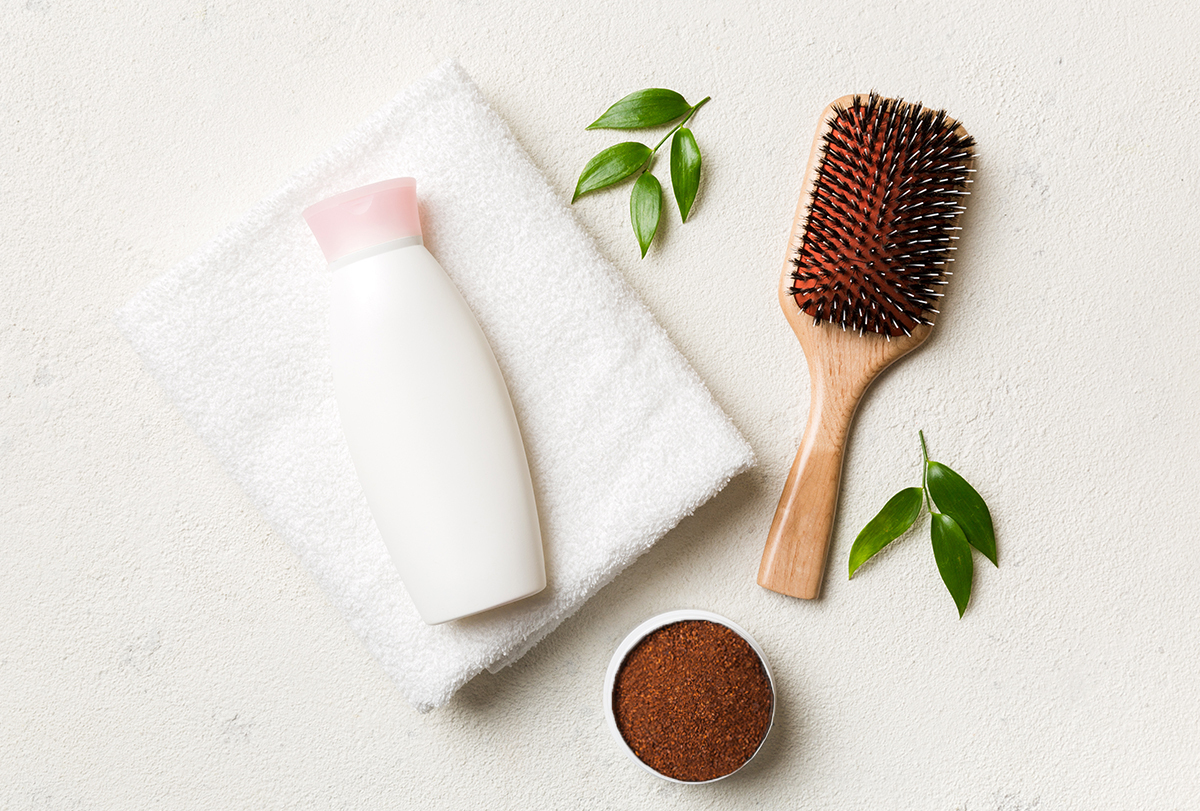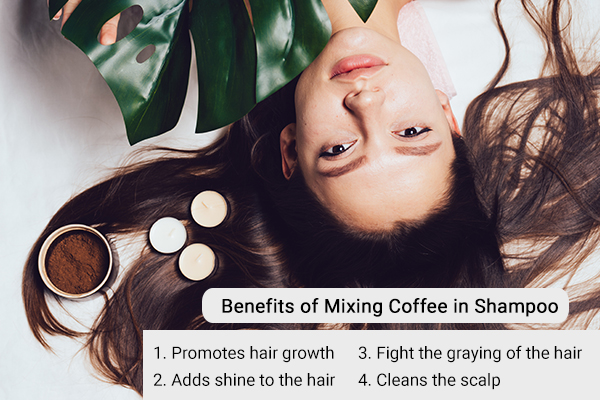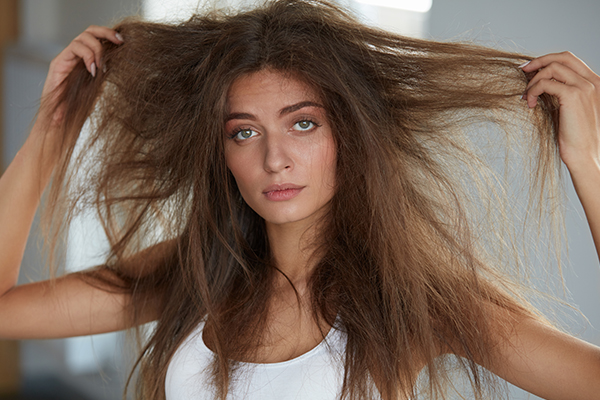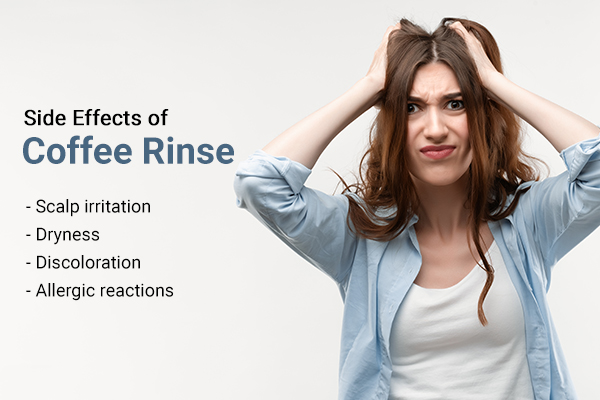In this article:
Yes, you can put coffee in your shampoo!

Even though it may sound a little strange or a bit unconventional, the truth is you can very well put coffee in your shampoo. This is because of the endless benefits coffee has for your hair.
Coffee is known to have a ton of nutrients and vitamins that are good for your hair in multiple ways. Studies have shown that coffee can facilitate and stimulate hair growth, decrease hair loss, and make your hair thick and healthy. (1)
How Much Coffee to Add to Your Shampoo?
Coffee has become a popular ingredient in hair care products due to its potential benefits for hair health. Some people add coffee to their shampoo to enhance its benefits.
The recommended amount of coffee to add to shampoo to reap its hair benefits varies depending on different experts, but many professionals suggest using 1–2 teaspoons of coffee grounds per 8 ounces of shampoo and the amount of coffee can be exceeded on the basis of the length and thickness of your hair.
Additionally, experts advise that it is crucial to use high-quality coffee and avoid using instant coffee or coffee with added flavors or additives, as it may not provide the same benefits and could potentially harm your hair and scalp.
In summary, the ideal amount of coffee to add to your shampoo for its hair benefits depends on your hair type, personal preference, and the quality of coffee used. Hair care professionals recommend starting with a small amount and gradually increasing it as needed while monitoring the effects on your hair and scalp.
How to use:
- Pour 4–5 tablespoons of shampoo into a small bowl and add ½ teaspoon of coffee powder to it. Give them a good stir so that they mix well.
- Moisten your hair with little water and apply the mixture all over it.
- Wait for 2–3 minutes, and then rinse it off properly with lukewarm water.
Benefits of Mixing Coffee in Shampoo

Here’s why coffee in shampoo is mocha needed for your hair.
1. Promotes hair growth
Coffee has been linked with the stimulation of hair growth.
A study aimed at investigating the effects of testosterone and caffeine on hair concluded that the latter is a favorable agent for the promotion of hair growth. The use of testosterone caused growth suppression in hair follicles, but this effect was successfully counteracted by caffeine. (2)
The research ascertained that caffeine was a stimulator of human hair growth and can be used in the management of androgenetic alopecia. (2)
2. Adds shine to hair
Coffee makes the hair soft and shiny. So, if you suffer from dull or dry hair, coffee may be a good way to fight the dullness while promoting hair regeneration.
These actions of coffee are attributed to the flavonoids present in coffee that condition the hair. (3) These chemical compounds are responsible for coffee’s antioxidant activity, which makes the hair shaft smooth, thereby relieving frizzy hair. (4)
3. Fights the graying of the hair
Hair aging manifests through different physical characteristics such as graying of the hair. Although hair graying is a natural process as age increases, some people can experience premature graying of hair due to various factors.
One of the most common factors for premature hair graying is oxidative stress. (5) Since caffeine is rich in antioxidants, it comes in handy in its prevention.
Coffee can also stain the hair, leaving a brownish tint that is visible on white or gray hair. (4)
4. Cleanses the scalp
Caffeine is famously used in the cosmetic industry because of its exfoliation property. Caffeine, when used topically, can be anticellulite in nature; it prevents exaggerated accumulation of fat in the cells. It is also known to penetrate the skin barrier quite easily. (6)
Which Is Better for Hair: Drinking or Applying Caffeine Topically?
Both drinking and applying caffeine topically can offer benefits for hair health, but they work differently.
Drinking caffeine can improve blood circulation and deliver nutrients to the hair follicles, which can promote hair growth and prevent hair loss. Caffeine can also help to reduce the level of dihydrotestosterone (DHT), a hormone that is linked to hair loss in both men and women. (2)
Applying caffeine topically can also stimulate hair growth and improve hair texture. Caffeine in hair care products can penetrate the hair shaft and follicles, promoting blood circulation and strengthening the hair roots. Additionally, caffeine has antioxidant properties that can protect the hair from environmental damage and free radicals.
It’s challenging to determine which method is better since both have their advantages and limitations. Drinking caffeine can offer systemic benefits for the body, while applying caffeine topically can provide more targeted benefits for the hair and scalp. However, both methods can work synergistically to improve overall hair health.
In summary, drinking caffeine and applying caffeine topically can offer benefits for hair health, and the choice depends on personal preference and hair concerns.
It’s important to use high-quality products and consult with a healthcare provider if experiencing hair loss or other hair problems.
Most-Asked Questions About Using Coffee on Hair

Can coffee damage hair?
Excessive use of any remedy or product can damage your hair. Although there is no research-based evidence to prove it, excessive coffee (either topically or orally) can be bad for hair health.
How long should I leave coffee in my hair?
Leaving the coffee rinse for around 15–20 minutes before rinsing it off is good enough.
What is a coffee rinse?
If you want the benefits of caffeine for your hair but don’t want to mix it with your shampoo, you can go for a coffee rinse. It is a great way to quickly cleanse the scalp, boost blood circulation, and soften the hair.
To prepare a coffee rinse, all you have to do is brew some coffee and let it cool. Spray it on your hair after shampooing. Massage the sprayed coffee on your scalp for a few minutes and leave it on for a few more. Then, rinse your hair with water and dry it.
How frequently should I use DIY coffee shampoo?
As a DIY coffee shampoo is a homemade shampoo, you can use it as many times as you need throughout the week. But make sure that you use it only once a day, or else your hair will become dry and damaged.
What happens if I put coffee on blonde hair?
Using coffee as a dye on blonde hair will give it “a muddy color,” and it’s definitely not dark enough to really deepen the color of brown hair.
What are the side effects of coffee rinses?
Not many studies have been performed on the side effects of coffee rinses, but experts say that while coffee can offer several benefits to the hair, excessive use or use in high concentrations can cause side effects.
Here are some of the potential side effects of using coffee rinses or shampoo with coffee according to hair care professionals:

- Scalp irritation: Applying coffee directly to the scalp or using a shampoo with a high caffeine concentration can lead to scalp irritation, redness, and itchiness.
- Dryness: Coffee can dry the hair, leading to frizziness and breakage. This is because caffeine can strip the hair of its natural oils, leaving it dry and brittle.
- Discoloration: Coffee can darken light-colored hair over time as it contains pigments that can stain the hair.
- Allergic reactions: Some people may be allergic to coffee or caffeine, leading to an allergic reaction when applied topically.
It’s essential to perform a patch test before using a coffee rinse or shampoo with coffee to ensure that you are not allergic to it. Also, avoid using too much coffee and limit its use to once a week or less.
Final Word
Coffee not only can wake you up but also can liven up your hair and promote hair growth. If you struggle with hair loss or dry and dull hair, coffee may help.
- Was this article helpful?
- YES, THANKS!NOT REALLY


